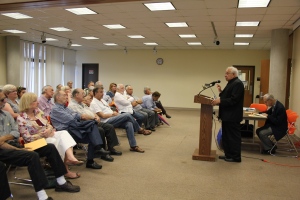
I hadn’t seen José Prats Sariol since 1997, when he offered a lecture on Phenomenology in the conference room of the School of Arts at the University of Havana. Seventeen years later he came to Miami to talk about the great poet Gaston Baquero, at the invitation of the Pen Club of Cuban Writers in Exile, and Saturday afternoon, June 14, he spoke to us of Gaston… and Cuba. The author of the novel Mariel (1997), the studies contained in Criticizing the critic (1983), The Artizada Matter, and others, presented the talk Gastón Baquero, poetic singularity.
“The fact that Gastón (an anti-communist, labeled with the epithets of ’Batista supporter’ and ’Franco supporter’) wrote a seminal text like “With César Vallejo in Paris — when it rains” is a ’singular’ event, if we see that Vallejo was a community who was the direct opposite — ideologically — of the Cuban who had to go into exile, after the pressures put on him by the ’Cuban Revolution,’” said Prats Soriol.
“Both lived in the same street, in the same block, on the same sidewalk in Madrid that harbored them, and only a sensitivity so high, this singular detail, would make one find the other. The singularity is that in this small deviation in which you say: this is different, it makes it singular. It is one of the problems of poetry today, and it greatly resembles that,” he said.
 The meeting featured the voices of the poets Orlando Rosardi and Angel Cuadra reading a poem by Baquero. At the end of each piece Sariol talked about the author of “Discourse of the Rose in Villalba,” about how Gastón came to Origins Magazine and how he later influenced the poets who followed him. But for Cuba, the current professor at the University of Arizona, offered an aside.
The meeting featured the voices of the poets Orlando Rosardi and Angel Cuadra reading a poem by Baquero. At the end of each piece Sariol talked about the author of “Discourse of the Rose in Villalba,” about how Gastón came to Origins Magazine and how he later influenced the poets who followed him. But for Cuba, the current professor at the University of Arizona, offered an aside.
Cuba is a duty
Cuba is the passion of this Doctor of Philology who has crossed the waters, the classrooms from Havana, Mexico to disembark with his lessons and poetic approximations “in the Arizona desert.” However, he admits that he would like to bring the map of everything produced on the island.
“Sadly, many things escape me, books, authors. I could talk with a certain authority about the generation of Origins, the generation of the 30s, but when I want to advance a little bit more, for example your generation, I start to slip. And why? Because of ignorance, because I don’t have access to the books. I met Magaly Alabau here in the United States, what ignorance, a critic of Cuban poetry who hadn’t read Magaly Alabau. I never had access to her, I didn’t kow her, although later I read her books, she became my friend.
“Prats, why haven’t you written about Magaly Alabau?”
“Out of ignorance,” I answered myself.
“As long as the dictatorship exists, it’s a duty for me. Of course I respect opinions, that other people aren’t interested, but for me it’s a duty as a Cuban to write and offer my point of view about the situation in Cuba, and I include all Cubans,” he concluded.
16 June 2014
